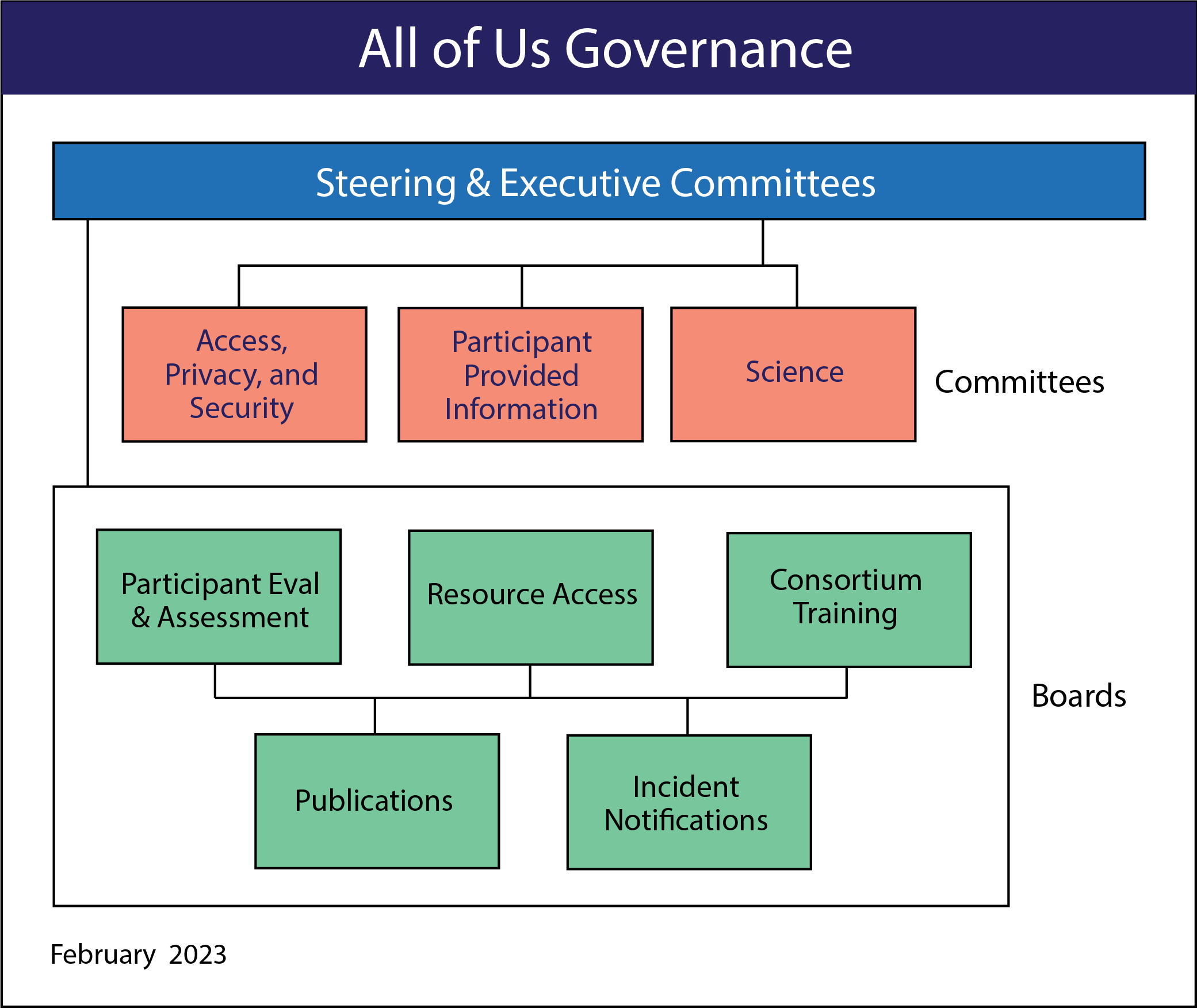Background
In establishing its governance structure, the All of Us Research Program has adopted the recommendations provided in the final report of the NIH Advisory Committee to the Director (ACD) Working Group. In implementing that governance, we are mindful of the program’s mission—including ensuring participant inclusion at all levels—and that our governance leadership and membership is diverse in expertise, institution, demographics, and experience.
All of Us is led by a chief executive officer (CEO) with the expertise and authority to provide strong, credible, and effective leadership. A Steering Committee consisting of principal investigators from all awardee institutions, NIH senior staff, and All of Us participant ambassadors provides a forum for members to discuss program strategies and long-term goals. In addition, a smaller Executive Committee, composed of a subset of Steering Committee members and select members of the consortium, meets with the CEO as needed to identify solutions to challenges and obstacles.
To improve efficiency, smaller groups oversee various areas of the All of Us Research Program. There are two types of these subordinate groups:
- Committees are deliberative groups that address specific challenges and coordinate the development of specific areas of the program’s operations.
- Boards are standing groups that are responsible for managing defined, recurring tasks.
The flexibility of this system has allowed the details to evolve, with subordinate committees forming and sunsetting to meet the needs of the program at any given time. The current components of the All of Us governance are described below.


Governance Groups: Leadership and Goals
Goals
- Oversee planning, coordination, and implementation of the program’s overall operations.
- Provide input regarding strategic directions for the All of Us Research Program.
Co-Chairs
- Stephanie Devaney
- Paul Harris
Goals
- Ensure that the program effectively meets its objectives and mission.
- Propose solutions to challenges and obstacles.
- Providing the CEO of All of Us with strategies, options, and information to help make final programmatic decisions.
Co-Chairs
- Josh Denny
- Paul Harris
Goals
- Extend All of Us' core values of protecting participant privacy, securing participant data, and building trust to the establishment and maintenance of the program’s scientific resources.
- Guarantee researchers’ access to the resources in a way that is educational, rewarding, responsible, and scientifically useful.
Co-Chairs
- Rosario Isasi
- Brad Malin
Participant Provided Information (PPI) comprises a broad range of appropriate health-relevant information, collected using modern digital technology techniques, including surveys, patient-reported outcomes, diaries/logs, and other self-reported approaches.
Goals
- Incorporates principles of inclusion, diversity, and cultural sensitivity, particularly for communities historically underrepresented in biomedical research in development of PPI instruments.
- Promotes long-term engagement with participants.
- Provides scientific value and produces new knowledge, with the goal of enabling researchers to discover and develop more effective ways to prolong health and treat disease.
Co-Chairs
- Brian Ahmedani
- Rob Cronin
Goals
- Articulate the scientific goals that inform the development of the All of Us platform and any pilot studies pursued within the program, including the data that participants are asked to share.
- Ensure that All of Us creates a resource that enables and anticipates broad, decades-long scientific exploration.
Co-Chairs
- Hoda Anton-Culver
- Dan Roden
Goals
- Implement and oversee aspects of the participant experience that leverage participant evaluation and assessment mechanisms.
- Curate, coordinate, review, and direct the systems and methods used to implement, track, and analyze the data relating to participants’ and potential participants’ interactions with the program.
- Provide input and a range of relevant subject matter expertise to All of Us regarding the development of new surveys, questionnaires, tools, or other feedback mechanisms to understand and enhance the participant journey.
Co-Chairs
- Toral Contractor
- Mercedita Roxas-Murray
Goals
- Implement resource access policies for All of Us, as developed by CAPS and consistent with the Data Access Framework.
Co-Chairs
- Stephen Sodeke
- Harvey Murff
Goals
- Implement and oversee internal All of Us Consortium Training Resources.
- Assess the training needs of All of Us Consortium members and ensure that appropriate training content is developed, deployed, and maintained to meet those needs.
Chair
- Hannah Sinemus
Goals
- Implement and maintain the consortium's rules governing manuscripts that report the development, management, and operations of All of Us.
- Address questions or concerns with project concepts, authorship disputes, and other outstanding issues.
Co-Chairs
- Brandy Mapes
- Elizabeth Cohn
Goals
- Implement the All of Us “Participant Data Protections and Incident Notifications” plan.
- Provide input on ways to enhance participant privacy protections and data security processes.
- Evaluate incident reports and implement notification processes should a privacy incident occur.
Co-Chairs
- Sonya Jooma
- Elizabeth Cohn
